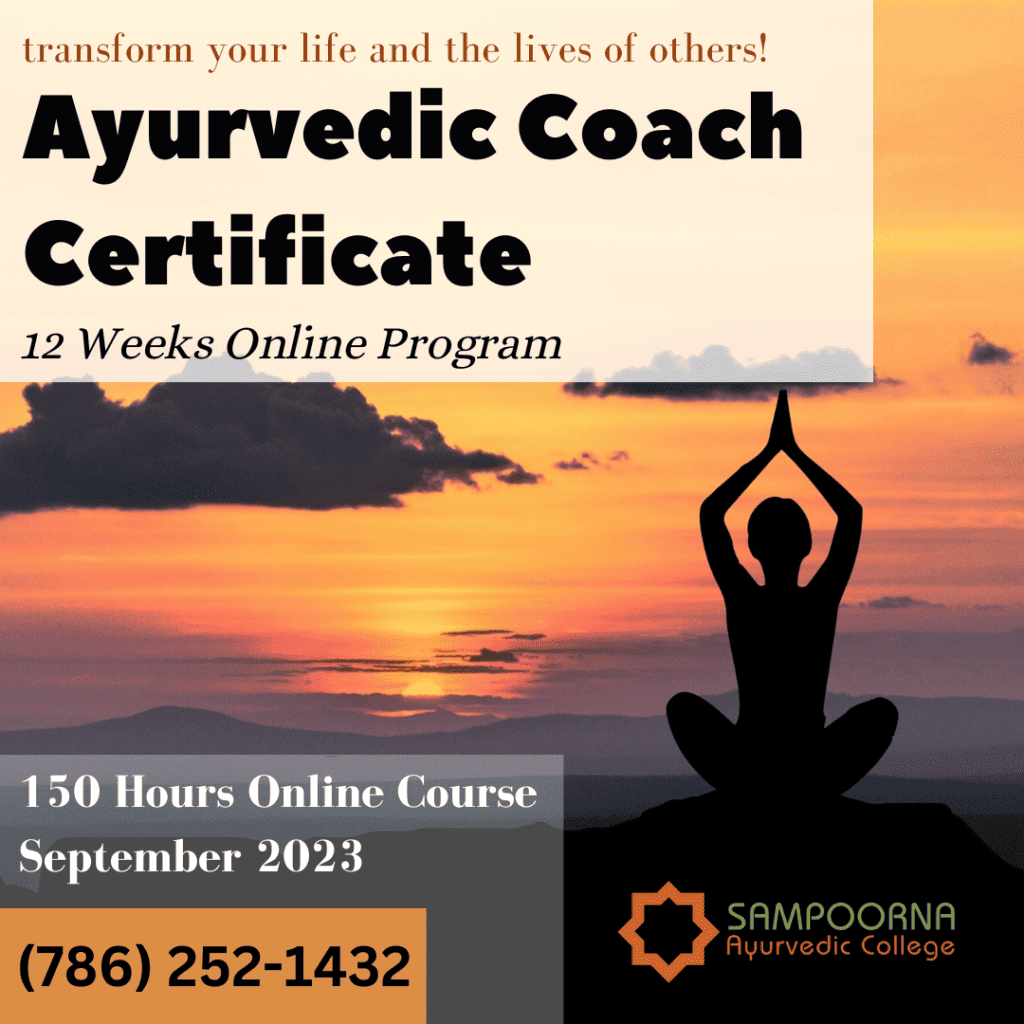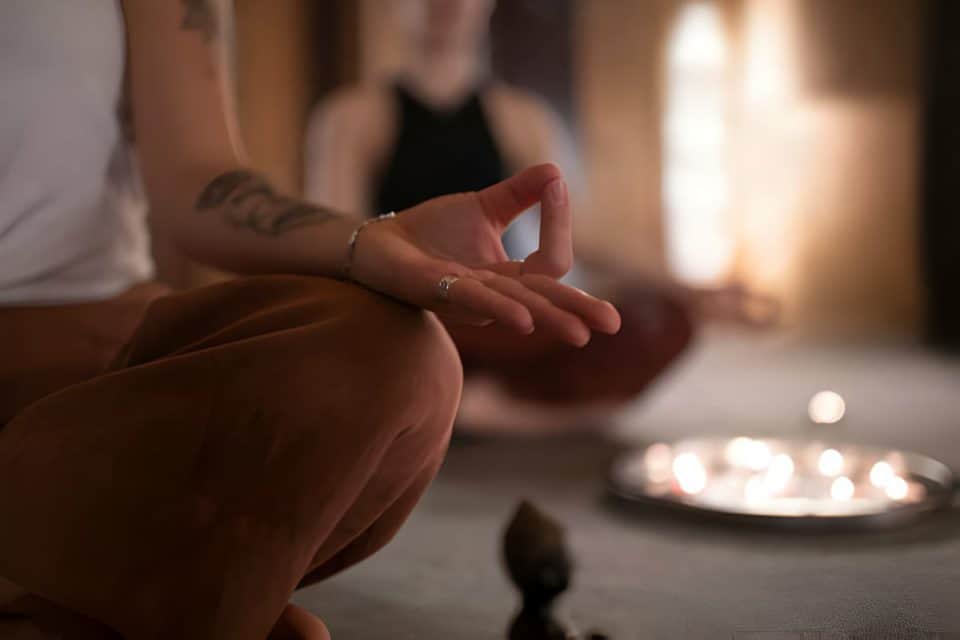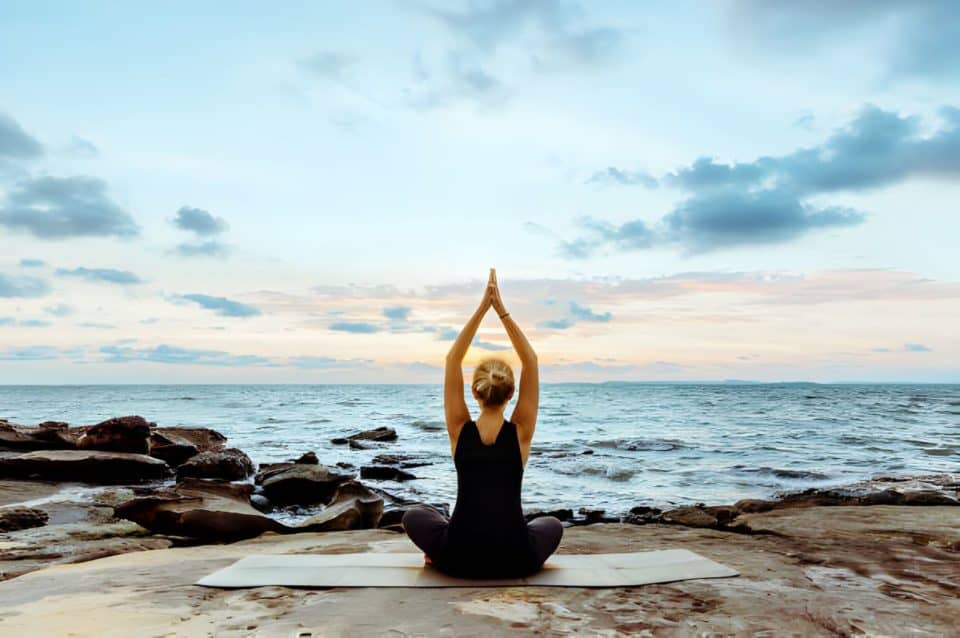Surya Namaskar, or “Sun Salutation,” is a powerful sequence of 12 dynamic postures designed to energize your morning and set the tone for a productive day.
In this blog post, we’ll delve into the fascinating origins of Surya Namaskar and how it evolved into a fusion of physical culture and yoga. We’ll also explore the associated mantras, chakras, and numerous health benefits of practicing Surya Namaskar.
Finally, we’ll guide you on incorporating this transformative practice into your daily routine, regardless of age or fitness level. Get ready to awaken your body, mind, and spirit with Surya Namaskar!

Origins of Surya Namaskar
Surya Namaskar, commonly known as the “Sun Salutation,” is a dynamic series of 12 postures often associated with yoga. However, this practice is neither an Asana nor a traditional component of yoga.
Its origins can be traced back to the 1920s when it was conceived and propagated by the King of Aundh, the Late Shrimant Balasaheb Pant Pratinidhi, and later by Sri K.V. Iyer and Sri Krishnamacharya.
Surya Namaskar is a complete physical exercise based on the Danda exercises explained in Vyayama Dipika, which were later incorporated into the models presented by Sri Krishnamacharya.
Dandaal, an ancient physical training technique practiced in India by wrestlers and martial artists, resembles Surya Namaskar. It is believed that the modern-day pushups used for bodybuilding in Western countries may have originated from Dandaal.
Over time, Surya Namaskar evolved into a fusion of physical culture and yoga, becoming the precursor to modern-day physical exercises. The practice was further simplified and adopted by various yoga schools, including
- Swami Sivananda Yoga Vedanta Center
- Bihar School of Yoga (BSY)
- Swami Vivekananda Yoga Anusandhana Samsthana (SVYASA)
The practices were gradually integrated into contemporary yogic practices.

The Bihar School of Yoga’s Surya Namaskar tradition consists of twelve steps (half a round), featuring three backward bending and two forward bending postures. To complete one round, the positions are repeated, except Ashwa Sanchalanasana, which is performed with the opposite side of the body in the second half. Each step is executed with a coordinated breathing pattern in sync with the physical posture.
When examining the sequence, steps 5, 6, and 7 closely resemble the earlier Dandaal practice. The postures allow the lungs to breathe naturally, alternating between inhalation and exhalation patterns. As a result, regular practice of Surya Namaskar can enhance lung capacity.
Do you know about Kundalini syndrome and yoga practices?
Surya Namaskar mantras and Beeja mantras
In addition to the physical postures, practitioners chant the twelve names of Surya during Surya Namaskar. Beeja Mantras, powerful vibrations that generate energy for the body and mind, serve as alternatives to the twelve names of the sun.
These are typically used during fast Surya Namaskar, where chanting the twelve names can be challenging. Chanted four times repeatedly during one complete round of Surya Namaskar, the Beeja Mantras and the associated Chakra for each posture are integral to the practice.
12 poses of surya namaskar and associated chakras
| Steps | Name of the Posture | Beeja Mantra/Mantra | Associated Chakra |
| 1 | Pranamasana (prayer pose) | Om Hraam/Om Mitraya Namah | Anahata |
| 2 | Hasta Utthanasana (raised arms pose) | Om Hreem/Om Ravaye Namah | Vishuddha |
| 3 | Padahastasana (hand-to-foot pose) | Om Hroom/Om Suryaya Namah | Swadhisthana |
| 4 | Ashwa Sanchalanasana (equestrian pose) | Om Hraim/Om Bhanave Namah | Ajna |
| 5 | Parvatasana (mountain pose) | Om Hraum/Om Khagaya Namah | Vishuddha |
| 6 | Ashtanga Namaskara (salute with eight parts) | Om Hrah/Om Pushne Namah | Manipura |
| 7 | Bhujangasana (cobra pose) | Om Hraam/Om Hiranyagarbhaya Namah | Swadhisthana |
| 8 | Parvatasana (mountain pose) | Om Hreem/Om Marichaye Namah | Vishuddha |
| 9 | Ashwa Sanchalanasana (equestrian pose) | Om Hroom/Om Adityaya Namah | Ajna |
| 10 | Padahastasana (hand-to-foot pose) | Om Hraim/Om Savitre Namah | Swadhisthana |
| 11 | Hasta Utthanasana (raised arms pose) | Om Hraum/Om Arkaya Namah | Vishuddha |
| 12 | Pranamasana (prayer pose) | Om Hrah/Om Bhaskaraya Namah | Anahata |
Surya Namaskar Benefits
Surya Namaskar is a powerful tool for optimal physical fitness and mental balance. Its myriad benefits extend to the muscles, joints, internal organs, circulatory and respiratory systems, and endocrine functions.
By practicing Surya Namaskar regularly, individuals can unlock the transformative potential of this ancient practice and experience a profound improvement in their overall health and well-being.
Strengthening Muscles and Joints
Surya Namaskar alternately contracts and expands the body’s muscles, toning the joints and redirecting stagnant blood to the kidneys and lungs for purification.
By targeting inactive muscles and joints, regular practice ensures the efficient functioning of the body’s internal organs, particularly the stomach and other abdominal organs.
Enhancing Blood Circulation and Eliminating Toxins
The practice of Surya Namaskar stimulates blood circulation, massages the kidneys, and improves intestinal peristalsis.
As a result, waste is efficiently eliminated from the body, and increased perspiration aids in toxin elimination, promoting healthy skin and preventing skin diseases.
Boosting Respiratory and Immune System Efficiency
Surya Namaskar improves gaseous exchange at the alveoli, enhancing respiration rates. It also increases the immune system’s efficiency, protecting the body against disease-causing agents through the production of antibodies and other mechanisms.

Increasing Mobility and Muscle Activation
Studies have shown that Surya Namaskar increases mobility in almost all the body’s joints and produces specific muscle activation patterns depending on the practitioner’s skill level.
The practice has been linked to improved physical fitness in school children, increased muscle strength and endurance, and reduced body fat and BMI.
Supporting Cardiovascular Health
Surya Namaskar is recommended to strengthen cardio-respiratory efficiency in healthy and cardiac patients. The practice has significantly decreased or altered physiological parameters such as heart rate, body fat, cholesterol, triglycerides, and LDL levels.
Balancing Endocrine Functions
Regular exercise of Surya Namaskar tones and massages the endocrine glands, stimulating brain centers and associated nerve fibers throughout the body. It helps to relieve mental disturbances, which can manifest as hormonal imbalances and diseases such as diabetes and thyroid dysfunction.
Surya Namaskar balances the circulatory, respiratory, and endocrine systems by stimulating the chakras, preventing disease, and promoting overall health.
Check how you can incorporate Ayurveda into your busy life.

Daily Practice of Surya Namaskar
This powerful practice is an excellent warm-up for the body and has numerous mental and spiritual benefits for all ages. How many Surya namaskars should be done daily depends on your age and physical condition.
Children: Embracing Energy and Flexibility
Children are naturally active, energetic, and flexible, making them ideal candidates for practicing Surya Namaskar. Depending on their energy levels, needs, and body conditions, children can engage in fast or slow-paced Surya Namaskar.
This practice can help them build strength, improve flexibility, and establish a foundation for their future yoga journey.
Teenagers: Balancing Metabolism and Relaxation
With their active metabolic patterns, teenagers should perform 12 to 24 rounds of Surya Namaskar. Following the practice, they should engage in Yoga Nidra (Complete Relaxation Practice) and Pranayama (breathing exercises) to balance their energy and encourage relaxation.
This combination helps teenagers stay fit and healthy and promotes mental clarity and emotional stability during significant changes.
Middle-Aged Individuals: Tackling Lifestyle Disorders
As middle-aged people often face various lifestyle disorders, it is essential to maintain a healthy and balanced daily routine. They are advised to practice 6 to 12 rounds of Surya Namaskar, followed by Yoga Nidra, Pranayama, and meditation.
This combination can help manage stress, improve flexibility, and enhance well-being.
Older Adults: Customizing Practice for Comfort
For individuals below 70, Surya Namaskar can still be beneficial when tailored to their comfort levels. They can adjust the number of rounds and modify the postures according to their abilities.
This gentle approach to Surya Namaskar can help maintain strength, flexibility, and balance as they age.
Conclusion
Surya Namaskar is a potent practice that can transform your physical, mental, and spiritual well-being. By incorporating this ancient series of 12 postures into your daily routine, you can experience improved strength, flexibility, and balance and enhanced respiratory, circulatory, and endocrine functions.
With its rich history, powerful mantras, and chakra-stimulating benefits, Surya Namaskar is an excellent addition to any wellness regimen. Embrace the energizing power of the sun and discover a revitalized sense of health and harmony through the practice of Surya Namaskar.




